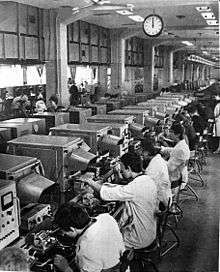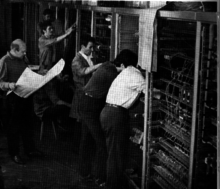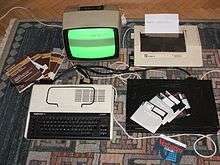Elwro
Elwro was a Polish company that manufactured mainframe and microcomputers from 1959 until 1989. Its plant was in Wroclaw. Computer models included Odra mainframe systems, and the Elwro 800 Junior microcomputer for education.
 | |
| Industry | Computer industry |
|---|---|
| Fate | Purchased by Siemens |
| Successor | Telect |
| Founded | 6 February 1959 in Wroclaw, Poland |
| Defunct | 1989 |
| Headquarters | , |
| Products | Odra mainframe systems, Elwro 800 Junior microcomputer |
Number of employees | up to 6000 |
Overview


The Wroclaw Electronic Works (Wrocławskie Zakłady Elektroniczne) were established 6 February 1959; the name Elwro was derived from the company's telegraphic address. The first model designed at this plant was the vacuum-tube based Odra 1001, released in December 1960; this was a research computer not put into serial production. The next model was the Odra 1002 which was constructed from transistors made in Poland, in 1962. The Elwro factory was responsible for mass production of the tube-based UMC-1 designed at Warsaw University of Technology; twenty five units were built from 1962 through 1965. Concurrently design work was proceeding on the Odra 1003 transistor computer, which was faster than the UMC-1, and used much less power. The first 1003 was built in 1963 and work was continued on improvements, resulting in the 1013 which was faster, and had a 256 word core memory as well as a drum with 8000 words.
In 1966, the Odra 1204 was built, with 16 k words of magnetic core memory and a 130 k word drum. This machine was aimed at data processing. However, software production was a bottleneck and the company was directed to produce a computer compatible with the ICL 1900; this "compatible" machine was the Odra 1304. It went into serial production in 1970. The Odra 1305 used integrated circuits and began production in 1970; it had one million bytes of main memory and disk drives to store 100 million bytes. A later model, 1325, used dual processors and further increase operating speed to 200,000 operations per second. The 1325 became popular because it supported common programming languages of the time such as ALGOL, COBOL and FORTRAN.
By 1966 the factory had built 100 computers.[1]
From 1985 to 1990 Elwro produced the Elwro 800 Junior microcomputer for education.
Peak employment at the plant was up to 6000 people. The factory was privatized in 1993 and purchased by Siemens, but wound down production. In 2000, the remains of the company were purchased by an American company, Telect, with plans to manufacture telecommunications equipment.[2]
In 2015 the Wroclaw city council named the former location of the factory ELWRO Square, to commemorate the company's contributions to information technology.
 Terminals and tape memory
Terminals and tape memory Elwro 800 Junior
Elwro 800 Junior Elwro 800 Junior system
Elwro 800 Junior system Elwro 801AT
Elwro 801AT- Elwro 804 Junior PC
See also
| Wikimedia Commons has media related to Category:Elwro. |
References
- Andrew Targowski, The History, Present State, and Future of Information Technology, Informing Science, 2016 ISBN 1681100029 pp. 122-125
- "Amerykanie w ELWRO". computerworld.pl.